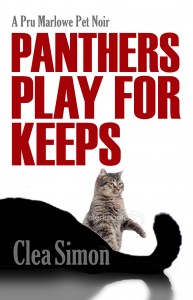Panthers Play for Keeps by Clea Simon
 By Anonymous-9
By Anonymous-9
Poisoned Pen Press calls it “pet noir” and I assumed it was a cozy with cuss words and a cat. But no—author Clea Simon is back with another beautifully-written suspense story about a psychic with a penchant for animals who helps solve a local murder deep in a Massachusetts forest. For anyone interested in psychic phenomena, communicating with animals, and crime fiction—a much broader audience than one might imagine—you can count me in.
Simon recently agreed to answer a few questions for THE BIG THRILL.
Are you a pet psychic?
Ha! No, I am not! I wish I was a pet psychic. I started writing about Pru being one because I think any of us who loves our pets feels we can understand them. I mean, I have conversations with my cat all the time. I do think I can read her body language—but often I imagine her talking back to me and I hear her voice as having a snarky tone. And that interaction became the basis for Pru and her tabby Wallis.
Your “pet noir” series could easily have been a cozy. Why noir?
Cozies have gotten a bad rap—people think “cutesy.” I prefer the term “traditional mysteries” for my cozies, like my Dulcie Schwartz and Theda Krakow books. Little graphic sex or violence, and lots of focus on character. The Pru Marlowe books do have that noir edge, but I have the same goals for them. What interests me in books are the people, the characters. I like traditional mysteries because they focus on the people. I want to write books where everyone is, to some extent, someone you could sympathize with. Not that you would necessarily commit murder, but you could understand how a person could be driven to the edge by something. And, of course, I want readers to be able to relate to my protagonists, even when they’re a little bookish and unworldly (like Dulcie) or snappy and standoffish, as Pru can be.
So is there something of you in these characters?
Of course! Writers are by nature solitary, so I can totally relate to Pru. She prefers the company of her cat to most people, and she has no time for fools. Granted, she’s a lot tougher than I am—and she drinks a lot more—but a lot of her conflicts are issues I, too, have worked through. And, yes, I talk to my cat. Dulcie, meanwhile, is my other side—she’s a bookworm who tends to believe that life should play out like one of her beloved Gothic novels. I’ve been accused of that, but you know, if you believe in a happy ending, sometimes you get it.
How do you write your books? Do you outline?
No, I’m much more a seat-of-the-pantser than a plotter. For me, a book starts with a problem of some sort, an interesting conflict that I want to resolve. For PANTHERS PLAY FOR KEEPS, it was the disappearance of the Eastern cougar. Now, supposedly this great cat—the alpha predator for New England, where I live and where the Pru Marlowe books are placed—is extinct. But they keep being seen… Some of that is because nature abhors a vacuum and other big cats (Western cougars and the like) migrate in to take advantage of the prey, the deer and what not. And some of it has to do with human interference: at least one cougar that was found dead, killed by a car, was deemed an escapee from a private zoo. But the others? Are these animals really gone? Maybe it’s that I like to think they aren’t. That our interference in their lives hasn’t killed them all. Maybe I like to think of them striking back.
How important is backstory in your books?
Very. One of the great things about writing series—and I am currently writing two, the Pru Marlowe pet noirs and the Dulcie Schwartz feline mysteries—is that I get to let my characters grow and develop over time. Pru, for example, is very prickly. The stories are told from her point-of- view, so I don’t spend a lot of time explaining that. But over the books, I do let people learn about her family background, the conflicts and why she fled her hometown. As the books continue, some of that is changing. She is learning to trust people, a little. But then again, because of her gifts—she can hear what animals are thinking—she can never entirely let down her guard. She’s already done time in a locked ward. She doesn’t want to go back.
What are you working on now?
The fifth Pru, tentatively titled KITTENS CAN KILL. It’s a story of a family so dysfunctional that each member thinks the other might have killed somebody, and I’m really enjoying developing the personalities of all the suspects. Because of the family dynamics, this book is also letting me show more of Pru’s past, which should help readers understand who she is. Right now, I’m working on the animals—I want to make very sure that the animals pick up on clues that would matter to them and that they would have access to. Though of course I have to make sure that Pru doesn’t always quite understand what she is hearing, at least not until the end.
*****
A former journalist, Clea Simon is the author of three nonfiction books and 15 mysteries in the Theda Krakow, Dulcie Schwartz, and Pru Marlowe pet noir series. The latter two mystery series are ongoing and include her most recent books, GREY HOWL (Severn House) and PANTHERS PLAY FOR KEEPS (Poisoned Pen Press). She lives in Somerville, Mass., with her husband, the writer Jon Garelick.
She can be reached on her website and on Twitter @Clea_Simon.
- Panthers Play for Keeps by Clea Simon - May 23, 2014
